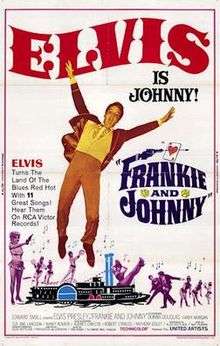Frankie and Johnny (1966 film)
| Frankie and Johnny | |
|---|---|
 Theatrical release poster | |
| Directed by | Frederick de Cordova |
| Produced by | Edward Small |
| Screenplay by | Alex Gottlieb |
| Story by | Nat Perrin |
| Starring | |
| Music by | Fred Karger |
| Cinematography | Jacques R. Marquette |
| Edited by | Grant Whytock |
Production company |
Frankie and Johnny Productions |
| Distributed by | United Artists |
Release dates |
|
Running time | 87 minutes |
| Country | United States |
| Language | English |
| Budget | $4,500,000 |
| Box office | $2,750,000 (est. US/ Canada rentals)[1] |
Frankie and Johnny is a 1966 American musical film starring Elvis Presley as a riverboat gambler. The role of "Frankie" was played by Donna Douglas from The Beverly Hillbillies TV series. The film reached #40 on the Variety weekly national box office list for 1966. The budget of the film was estimated at $4.5 million. The director was Frederick De Cordova, who was the director and producer of The Tonight Show Starring Johnny Carson beginning in 1970.
Plot
Johnny and girlfriend Frankie are performers on a Mississippi River riverboat, which also has a casino. Johnny is a compulsive gambler who is down on his luck and in debt.
Johnny and his friend Cully, a musician and composer, visit a gypsy camp to get his fortune told. A lady reads tea leaves and tells Johnny that he will soon meet a red-haired woman who will bring him luck.
Back on the boat, Johnny and Cully promptly encounter Nellie Bly, their boss Clint Braden's on-again, off-again girlfriend. Nellie has just caught Braden seducing another singer, Mitzi. Since she has red hair, Nellie is persuaded by Johnny to touch his chips for luck. After he wins, Johnny is convinced that the gypsy must be correct.
Frankie finds out and becomes jealous, as does Johnny's boss. In a bit of musical theatre, Frankie shoots Johnny for dancing with Nellie Bly while singing Cully's new song. A Broadway recruiter sees the riverboat show and buys the rights to this new song, suggesting that Frankie and Johnny should work together with him in New York City.
Landing in New Orleans, the musical cast and riverboat crew attend a masked ball. Frankie, Nellie and Mitzi each rent the same Madame Pompadour costume.
Johnny is eager for the luck of redhead Nellie to win more money, contrary to Frankie's expressed wishes. Being masked and in costume, Frankie and Nellie scheme to switch places to test Johnny's lucky-redhead theory. Johnny wins ten thousand dollars at a roulette wheel, but when he kisses the woman he believes to be Nellie, he discovers the switch. Frankie is furious. She throws the winnings out the window.
Blackie, a dim-witted stooge who works for the boss, hears Braden drunkenly complain about how he has lost Nellie. Thinking he can be of help, Blackie switches the blank cartridge in Frankie's stage gun for a real bullet.
The boss tries to prevent the impending disaster, but arrives at the theatre too late. Frankie has shot Johnny for real. Frankie forgives his gambling as the love of her life appears to be dying on stage. Johnny then stands up, apparently unhurt. Johnny was saved because the bullet struck a lucky medallion he was wearing that Frankie had given him.
Primary cast
- Elvis Presley as Johnny
- Donna Douglas as Frankie
- Harry Morgan as Cully
- Sue Ane Langdon as Mitzi
- Nancy Kovack as Nellie Bly
- Audrey Christie as Peg
- Anthony Eisley as Clint Braden
- Robert Strauss as Blackie
- Joyce Jameson as Abigail
- Naomi Stevens as Princess Zolita (uncredited)
- Dave Willock as the bartender (uncredited)
Production
There was discussion that Ann Margaret might play the female lead - she owed Edward Small a film under a contract with her.
Filming started in May 1965 and took place in Hollywood and New Orleans.[2] Under his contract with United Artists, Presley was paid $700,000 plus 50% of the profits.[3]
Reception
The New York Times reported that the film opened with a "dull thud" and "sheds feathers almost from the start" stating that Presley's formula never before "seemed so feeble and so obvious."[4]
Kevin Thomas, of the Los Angeles Times, felt it was a good vehicle for Presley.[5]
Soundtrack
See also
References
- ↑ "Big Rental Pictures of 1966", Variety, 4 January 1967 p 8
- ↑ Looking at Hollywood: 'Harlow' Being Shot as 'Instant Movie' Hopper, Hedda. Chicago Tribune (1963-Current file) [Chicago, Ill] 10 Apr 1965: a5.
- ↑ U.A. Promises Elvis A Whopping 50% Deal Dorothy Kilgallen:. The Washington Post, Times Herald (1959-1973) [Washington, D.C] 15 June 1965: D5.
- ↑ New York Times. July 21, 1966, "Neighborhoods Get 'Frankie and Johnny', New Presley Film". Accessed February 27, 2016
- ↑ Thomas, Kevin. Los Angeles Times, May 27, 1966, "'Frankie and Johnny' Good Presley Vehicle". Accessed February 27, 2016.
External links
- Frankie and Johnny at the Internet Movie Database
- Frankie and Johnny at the TCM Movie Database
- Frankie and Johnny - Sergent.com.au